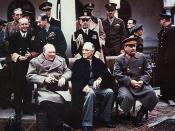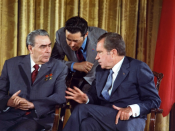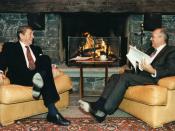The origins of the Cold War lie in the differences between the systems of both the United States and the Soviet Union. It is an interplay between ideology and pragmatic power politics, and the creation of tension and mistrust which had been evident since the Russian Revolution. During World War II differences were put aside, but the problems reappeared, and it was a changing post-war world.
There are three major common explanations for the origins of the Cold War: traditional, revisionist, and post-revisionist . Until the 1960s, most historians believed that the Cold War was the direct result of Stalin's aggressive Soviet expansionism, that the Soviets were to blame.
According to Michael Hart (1986), '...the Cold War was caused by the military expansionism of Stalin and his successors. The American response... was basically a defensive reaction. As long as Soviet leaders clung to their dream of imposing Communism on the world, the West had no way (other than surrender) of ending the conflict.
When a Soviet leader appeared who was willing to abandon that goal, the seemingly interminable Cold War soon melted away.'
Revisionist historians tend to regard the outbreak of the Cold War as a result of American hostility or, as diplomatic incompetence. This revisionist approach reached its height during the Vietnam War when many people suggested that America was 'as bad as Russia'. One of the most extreme revisionists was Gabriel Kelko, who wrote The Limits of Power: The World and United States Foreign Policy in 1972. One reviewer of his books says that 'he devoted his entire professional life to blaming the United States for the Cold War'. In his book Kelko suggested that Truman should have given Stalin the atomic bomb in 1945 and claimed that Russia treated Poland well in 1945. He also...


